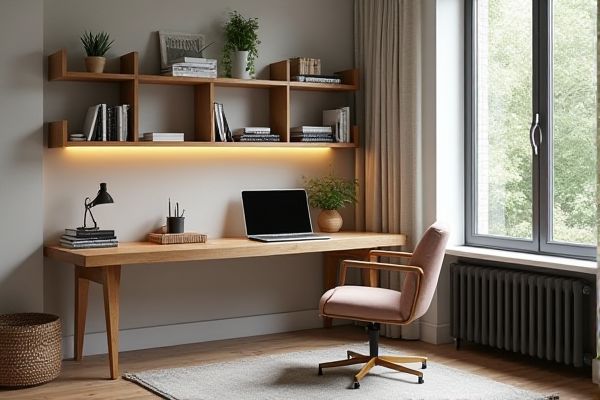
A built-in desk offers a seamless, space-saving solution perfectly tailored to your room's dimensions, while a freestanding desk provides flexibility and easy relocation to suit changing needs. Explore the rest of the article to discover which desk type best matches your workspace requirements and lifestyle.
Table of Comparison
| Feature | Built-in Desk | Freestanding Desk |
|---|---|---|
| Installation | Fixed, requires professional installation | Moveable, easy to set up |
| Space Efficiency | Maximizes space, often custom-fit | Less space-efficient, standard sizes |
| Design Flexibility | Customizable for room style | Wide variety of styles available |
| Durability | Typically more durable and sturdy | Varies with materials and build quality |
| Cost | Generally higher due to customization | More affordable, budget-friendly options |
| Mobility | Fixed, not portable | Portable, easy to relocate |
| Storage Options | Integrated storage solutions | Optional storage accessories |
Introduction to Desk Types: Built-in vs Freestanding
Built-in desks are custom-designed furniture pieces integrated into a room's architecture, maximizing space efficiency and providing a seamless look. Freestanding desks offer mobility and flexibility, allowing easy relocation and varied room arrangements. Choosing between built-in and freestanding desks depends on spatial constraints, design preferences, and functional needs in home or office settings.
Space Efficiency and Room Layout
Built-in desks maximize space efficiency by utilizing wall space and often include custom storage solutions that fit seamlessly into the room layout, making them ideal for small or irregularly shaped areas. Freestanding desks offer flexibility in placement and can be easily moved or reconfigured to suit changing room layouts but typically require more floor space. Choosing between the two depends on the balance between fixed, space-saving design and adaptability in a room's arrangement.
Installation and Flexibility
Built-in desks offer a permanent, space-saving installation ideal for customized work areas but limit reconfiguration options. Freestanding desks provide greater flexibility for rearranging or relocating your workspace without complex installation. Choosing between the two depends on whether your priority is a fixed setup or adaptable office layout.
Design Aesthetics and Customization
Built-in desks offer seamless integration with your room's architecture, providing a sleek, cohesive design that maximizes space and complements existing decor. Freestanding desks provide greater customization options with various styles, materials, and sizes, allowing you to easily adapt your workspace as your needs evolve. Your choice depends on whether you prioritize a streamlined aesthetic or flexible design personalization.
Durability and Longevity
Built-in desks are typically anchored to walls or custom cabinetry, offering superior stability and durability due to their solid construction and integration with surrounding structures. Freestanding desks vary in materials and construction quality, often leading to less longevity compared to built-ins that resist wear and maintain structural integrity over time. For prolonged use, built-in desks provide enhanced lifespan and robustness, making them ideal for spaces requiring long-term, heavy-duty functionality.
Storage Options and Organization
Built-in desks offer customized storage solutions tailored to fit specific room dimensions, integrating shelves, drawers, and cabinets seamlessly for enhanced organization. Freestanding desks provide flexible storage options with movable components like detachable drawers and add-on shelves, allowing adaptation to different spaces and needs. Prioritizing accessibility and maximizing workspace depend on whether fixed built-in units or adaptable freestanding models better suit the user's organizational preferences.
Cost Comparison: Built-in vs Freestanding
Built-in desks typically involve higher upfront costs due to custom design, installation fees, and potential remodeling expenses, whereas freestanding desks offer more budget-friendly options with varied prices depending on materials and brand. Long-term value for built-in desks can be greater through increased home resale appeal and efficient use of space, while freestanding desks provide flexibility and lower initial investment. Understanding these cost dynamics helps buyers balance immediate affordability against potential long-term benefits.
Maintenance and Cleaning
Built-in desks require less frequent movement during cleaning, allowing easy access to dust and debris behind and beneath the structure, while freestanding desks offer greater flexibility for thorough maintenance by enabling relocation. The materials used in built-in desks often feature integrated finishes that resist stains and scratches, reducing the need for intensive cleaning compared to the varied surfaces of freestanding desks. Proper maintenance of built-in desks ensures longevity through secured attachments, whereas freestanding desks may demand regular tightening of bolts and joints to maintain stability.
Resale Value and Future Adaptability
Built-in desks often increase resale value by adding custom, integrated appeal that buyers find attractive, enhancing overall property worth. Freestanding desks offer greater future adaptability, allowing easy relocation or replacement to suit evolving needs without remodeling. Choosing between the two depends on prioritizing long-term investment impact versus flexible workspace solutions.
Choosing the Right Desk: Key Considerations
When choosing the right desk, consider the space available and your work habits; built-in desks maximize room efficiency and provide a seamless, custom look, while freestanding desks offer flexibility and easy relocation. Evaluate your need for storage, cable management, and ergonomic features to match your workflow and comfort requirements. Your decision should balance functionality, design preference, and the adaptability of the desk to your evolving workspace.
 homyna.com
homyna.com